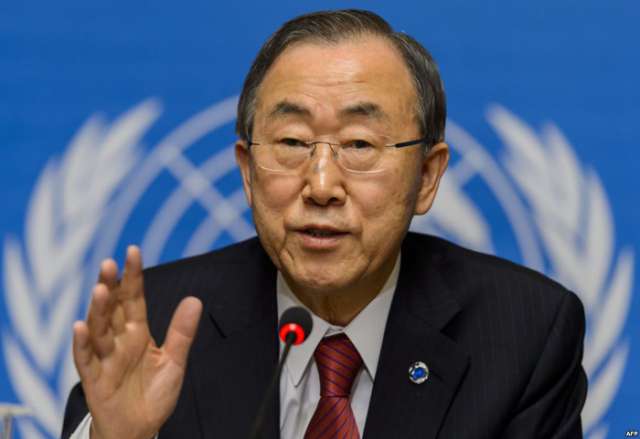The UN secretary general told that Guardian that Russia and China should “look beyond national interest” and stop blocking security council action on the conflict in Syria as the flow of refugees to Europe reaches unprecedented levels.
“We need some solidarity, unity of purpose, particularly among the permanent members of the security council,” he said in an interview. “When they are divided, it is extremely difficult for the United Nations to deliver. That’s why I’ve been urging the members of the security council to look beyond national interest. We have to look for the global interest.
“When the security council members are united we have seen very speedy and tremendous impact in addressing the issues, as we have seen in the case of chemical weapon investigation in Syria.”
Although Ban did not name Russia and China, the two countries have on several occasions blocked resolutions critical of the Syrian government, threatening sanctions or pressing it towards a negotiated settlement. Last year, Moscow and Beijing also vetoed a move backed by the 13 other permanent and non-permanent members of the security council to refer the Syrian conflict for investigation by the international criminal court.
Ban had backed the referral to the ICC, saying the Syrian people “have a fundamental right to justice”.
He has previously spoken of his “shame” and “anger” at the international community’s “impotence to stop the war” in Syria, and said the UN’s credibility had suffered as a result.
There are various estimates for the death toll in Syria, extending up to more than 300,000, while about half the pre-war population of 22 million has been uprooted.
The UN high commissioner for refugees has described the exodus of people fleeing the fighting as the largest refugee crisis in a generation. About 4 million people have crossed into neighbouring countries with almost half of those going to Turkey. Tens of thousands have made the difficult and often dangerous journey to Europe.
The UNHCR said nearly 350,000 Syrians had applied for political asylum in Europe since the war began.
In August, the Syrian president, Bashar al-Assad, said he was confident Russia would continue to back his regime.
“We have strong confidence in the Russians, as they have proven throughout this crisis, for four years, that they are sincere and transparent in their relationship with us,” he said in an interview with Hezbollah’s al-Manar television network.
Assad described Russia as “principled”, while “the United States abandons its allies, abandons its friends”.
Last month, Barack Obama called on Russia and Syria’s principal regional ally, Iran, to “recognise that the trend lines are not good for Assad”.
Speaking to the Guardian at the start of an investigative series on the future of the UN as it turns 70 this autumn, Ban acknowledged that growing demands within the UN for the security council to be reformed.
“A lot of interesting ideas have been proposed by the member states and there is widespread feeling and opinion among member states that considering such dramatic changes in political and security field in the world, the security council should change also, in a more democratic way, transparent and accountable way,” he said.
While there is frustration that international action to try to end Syria’s deepening humanitarian crisis is being blocked by Moscow and Beijing, criticism of the permanent members’ use of the veto for narrow political interest is longstanding. The US has used its veto to protect Israel from criticism more times than the total number of vetoes cast by the other permanent members combined.
More about:
















































